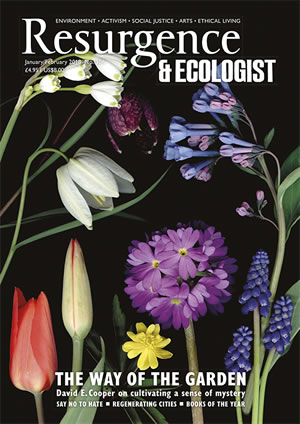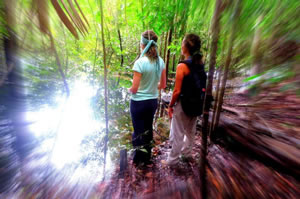The Amazon rainforest is the biggest forest on the planet and crucial for the regulation of the Earth’s climate. The need to protect it is unquestionable, but we need to engage in keeping it alive not only because of its environmental services.
The forest and all life it carries has as much right to live as we do. This awareness may open up something that is barely mentioned in efforts to find solutions to decrease deforestation: the importance of connecting emotionally with the rainforest. Many of us in the world are late to cultivate deeper feelings of gratitude, respect and appreciation towards this vital organ of Mother Earth, but putting too much stress on the need to protect the rainforest because of the environmental services it provides can be obstructive. As author Charles Eisenstein said, during an Earth Talks event at Schumacher College: "by that logic, if we could somehow find a substitute for Nature, then we don't need to take care of it. The kind of changes that we need to make right now are much bigger than that and those deep changes, brave changes, can only come from love".
Connectedness towards Nature is a very important tool to deal with environmental challenges. According to the concept of Emotional Affinity Toward Nature (EATN), the more emotionally connected we are with Nature, the more we will want to act in its favour. Of course, this premise is valid in every part of the globe, but let´s stay with the example of the Amazon.
During my research for the dissertation Reconnecting with the Amazon: a journey of awakening deep feelings for the rainforest,* , which I wrote as part of my MSc in Holistic Science at Schumacher College, I found studies that showed, historically, two dominant views of the Amazon; one that it is exotic and fantastic; and two, dangerous and inhospitable. These were thoughts from European explorers, scientists and naturalists who arrived in the region from the 16th century. Their observations were absorbed by colonial and post-colonial Brazilian culture and education and have provoked more separation than union between people and the rainforest. Since the 1960s, many Brazilian governments have been emphasizing the need to “developing” the Amazon region.
While such stereotypes persist, the Amazon is disappearing. In 2013, the total accumulation of deforestation was of 762.979 km². To help us have an idea of what this means, scientist Antonio Nobre explains in the scientific assessment report Future Climate of the Amazon: "Placed in the context of time, the figures are staggering: 12,635 soccer fields deforested per day, 526 per hour, 8.8 fields or 36,291 m² per minute, or 605 m² per second without stopping over the last 40 years".
What I wanted to explore in my research was how different this scenario would be if people had more feelings of appreciation for the Amazon. Would they be more interested in taking action or at least decreasing the consumption of beef, the number one cause of its destruction? The answer is probably yes.
Holistic science is a pathway to inspire more awareness and connection. While mainstream science focuses on quantity and proof of what can be seen, named and explained, a holistic view goes beyond and provokes new thinking. By studying Gaia Theory, we may consider that the Amazon forest is a self-regulating organism, a living being. By studying panpsychism, the philosophy that doesn't separate mind and matter, we may conclude that the forest has a mind. "Nature is not only matter. She is also spirit", said Carl Jung, in the book The Earth Has a Soul. Accepting this can result in profound ethical changes in the way we feel and behave in relation to the rainforest.
We don´t have much time to build this deeper connection. Humanity has lost about 20% of the Amazon so far. The clearing of around 40% would prevent the Amazon re-establishing itself. It could become a desert.
“The Amazon is so special and unique. To lose it would mean losing the very mother source of the spirit of our relation to the divine,” spiritual theologian Matthew Fox said. “I had the privilege of visiting the Amazon. It is a tremendous blessing. The forest loves us. What is in our hearts that prevents us from loving it back?” Prejudices, fears of all kinds, ambition, poor education and lack of emotional connection are certainly part of the answer.
Here is another example of how superficial our relationship with this vital organ of Mother Earth is: what do we normally learn, mostly at school, about the Amazon? To cite some examples: it covers 6,9 million km² and encompasses nine countries in South America. It holds one-third of the total fresh water of the planet, its hydrographic basin has 6 million km² and so on. Despite the numbers that are often used to describe it, what feelings about the rainforest are awakened inside us with such information? I concluded during the writing of my dissertation that we remain on the surface. The rainforest is much more than mere numbers. "The Amazon is a vast sentient, living, breathing mind. It is intelligent, awake and deeply wise", the ecologist and philosopher David Abram said.
We can connect with the rainforest no matter where we are. The biophilia hypothesis, developed by Edward O. Wilson, affirms that humans are born with a natural affinity for Nature. There is 'something' inside each one of us that simply 'knows' that we are not separate beings, but interconnected; that we belong. We are born with this affinity. And, at the end, the Amazon is a beautiful manifestation of the natural world.
Try this: sit in a quiet place in Nature, connect with the place you are in and then think about the rainforest. Remember that the forest is dying and being killed 24 hours a day. Then, send it love and think about how that emotion feels inside you.
Satish Kumar, even before visiting the Amazon for the first time last year, told me: “If we love the forest, animals, peoples and all the creatures of the Amazon, then we can connect with the whole planet Earth. They are the heart of the Earth. Unless we feel love for Nature, for the Amazon, no scientific, intellectual and philosophical prepositions can be helpful. Emotional connection to the Amazon is the most fundamental approach”.
In his book Eight little Piggies: More reflections in Natural History, Stephen Jay Gould writes that the emotional bond between ourselves and Nature is necessary to win the battle of saving species and environments. “For we will not fight to save what we do not love, but only appreciate in some abstract sense”.
It´s more than time to feel love, affection, gratitude and respect for the Amazon rainforest. More than raising awareness on our own consciousness, a pathway to that is investing in a new form of education about the Amazon – an education that inspires, more than only giving quantitative information. It´s time to love. To connect. To protect. Here is a big reason for hope. This is key to keeping the rainforest alive now and for generations to come.
*www.academia.edu/34954509/Reconnecting_with_the_Amazon_Awakening_deep_feelings_for_the_rainforest







